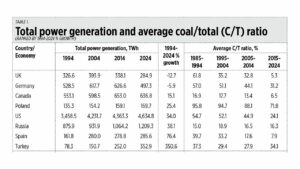Consider this as Part 2 of my earlier article in this column, “Economic basis of net zero is zero” (Sept. 5, 2023). In that paper, I compared coal consumption per capita, electricity generation per capita and GDP per capita for the period 2002 vs 2022.
The results were: one, Industrial countries that have fast “decarbonization” and are weaning themselves away from coal consumption have an overall electricity generation that either flatlines or declines, and their GDP per capita has expanded by two times at most. And two, the electricity generation of developing Asian countries that have expanded their coal consumption per capita has doubled or quadrupled, and their per capita GDP has expanded up to five times.
For simpler definition, “net zero” here refers to the goal of deliberate reduction of coal/total power generation or C/T ratio as countries transition towards more solar/wind in their electricity production.
In this column, I will compare the C/T ratio and total power generation of countries over four decades, their average inflation rate and average GDP growth.
Two industrialized countries have experienced an ironic decline in their total power generation — the UK and Germany. The UK’s electricity generation fell from 327 terawatt-hours (TWh) in 1994 to 285 TWh in 2024 or a 12.7% change. Germany’s power generation fell from 528 TWh in 1994 to 497 TWh in 2024 or a 5.9% change. The decline coincided or was indirectly caused by a huge decline in average C/T ratio — the UK from 62% in 1994 to only 5% in 2024, and Germany from 57% in 1994 to 31% in 2024.
In contrast, China and Vietnam had a 987% and 2,370% increase, respectively in total power generation from 1994 to 2024. The decadal C/T ratio was 64-77% for China and 29-43% for Vietnam. The Philippines had a 326% increase in power generation from 1994-2024 and average C/T ratio rose from7% to 56% (see Table 1).
The economic consequences of rapid “decarbonization” and mad rush to net zero for the industrial west are clear. For the period 1985-1994 to 2015-2024, average GDP growth rate was declining for the UK from 2.6% to 1.4%, for Germany from 2.8% to 0.9% and for Canada from 2.4% to 1.8%.
The average inflation rate from 1995-2004 to 2015-2024 periods for the decarbonizing and net zero countries had rising trend: from 1.6% to 3% for the UK, from 1.3% to 2.7% for Germany and from 2% to 2.6% for Canada.
In contrast, coal-heavy Asians had rising or high growth GDP from 4-10% and declining average inflation rate. This was true for the Philippines, India, Malaysia, Indonesia, China and Vietnam. Taiwan, Thailand and South Korea had modest GDP growth of 2-9% and low inflation rate (see Table 2).
So for developing, emerging and industrialization-aspiring countries like the Philippines, we should prioritize net growth and not net zero, declining inflation and not declining power generation. The economic basis of net zero is zero. So I repeat the conclusion of my earlier article on this topic: We should prioritize our national agenda — more sustained growth, more job creation, more electricity for rising demand from households and industry. The global agenda of global ecological central planning should take a backseat.
My hats off to three Philippine energy companies that have big coal plants — Aboitiz Power, Meralco Power Gen (MGEN) and San Miguel Global Power. They may be demonized by climate-obsessed activists, but they are the ones that give us 24/7 electricity in this country and keep the investors here to continue creating jobs.
Bienvenido S. Oplas, Jr. is the president of Bienvenido S. Oplas, Jr. Research Consultancy Services, and Minimal Government Thinkers. He is an international fellow of the Tholos Foundation.
minimalgovernment@gmail.com

